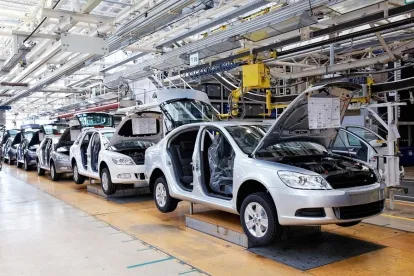Today, the Mexican government confirmed that manufacturing of transportation equipment includes the automotive industry and is an essential activity permitted to operate. There are some inconsistencies reported between the Ministers and the Governor of the State of Mexico regarding the precise date of the reopening, although many project it to be between May 18th and May 31st. Automotive manufacturers will be required to adhere to health protocols in order to protect against COVID-19. While the specific health protocols are still pending and have not yet been announced, automotive suppliers should consider the following operational recommendations as they prepare to resume operations.
Mandatory Health Measures (Pending Further/Expected Announcements)
-
Refrain from either requesting or enabling presence at the workplace of people 60 years and older, as well as “groups of persons with risk of developing a serious illness and/or to die from such illness” (such groups of persons are defined as those including pregnant or lactating women, minors below five years of age, persons with disabilities, persons with chronic, non-transferable diseases such as high blood and lung pressure, liver insufficiency, lupus, cancer, diabetes mellitus, obesity, metabolic or hepatic insufficiency, cardiac illness) or with a medical treatment or condition that would suppress their immune system.
In this regard, since it is practically impossible without an employee’s consent, for companies to know if certain of these circumstances exist (since medical files are confidential), it is advisable that, prior to allowing employees to enter the workplace, employers request that the employee execute an affidavit (preferably on a daily basis), representing (i) that they have not been diagnosed with COVID-19 and do not have any of its symptoms; (ii) a statement that, to best of their knowledge they have not been in contact with infected individuals; and (iii) the temperature record taken at the point of entrance to the facilities.
-
Prevent gatherings or clustering of more than 50 persons. Considering the nature of automotive manufacturing, if the layout of the relevant facilities enable two or more access points, and to the extent that such premises are ventilated, a temporary physical barrier should be installed to enable two or more groups of employees working in different lines of production. In addition, suppliers should consider restructuring working shifts (e.g., from one to two, or even three).
-
Individuals shall wash their hands frequently. To such extent, it will be the employers’ burden to provide the necessary sanitary supplies (disposable tissues and towels and in its case antibacterial gel with at least 70% of alcohol content).
-
Individuals shall apply proper respiratory etiquette when sneezing or coughing (covering nose and mouth with a tissue or with the forearm).
-
No kiss, hand or hug salutations (only distant salutations).
-
Implement social distancing measures. The suggested distance is 1.5m to 2m between work-stations and individuals at all times.
Practical Suggested Measures
-
Implement a health checkpoint at the entrance and exit of the facility. At such checkpoint, all employees and customers as they access or leave the facilities should be subject to temperature screening, use of hand sanitizers, step into sanitization carpets and sign the affidavit suggested in the section above in regards to their health conditions.
-
Provide employees with health protective equipment (facemasks, gloves and googles if required). The facemasks do not need to be surgical standard. Same would only need to be intended to prevent dispersion of virus if an employee inadvertently attends to the workplace being asymptomatic.
-
Sanitizing the work place, including the transportation vehicles when provided by the company. In such cases, transportation services should be increased to cause and ensure social distancing between employees. In case of personnel lockers, control access to prevent gathering of employees and set sanitization schedules when shifts change to ensure a sanitized space.
-
Post at the workplace in strategic locations the health measures recommended and instructed by the health authorities (e.g., social distancing, 1.5 up to 2 meters of distance between people or work-stations, emergency line posted by the federal government to report cases, etc.). A set of recommended posters in regards to COVID-19 are available at the Ministry of Labor.
-
Cause employees to attend to the workplace with staggered arrival times to prevent gatherings or lines of employees accessing the facilities. The same should apply to mealtimes. When possible, it would be advisable to include a physical barrier on the dining-tables to maintain social distancing
-
Appoint an employee and employer’s representative to provide training in regards to the health recommendations and to cause employees to attend to such training sessions.
-
Continue to allow home-office to vulnerable employees.
-
Request a Notary Public to attest the security and health protocols implemented by the company, and demonstrate what is necessary in order to obtain the attestation. When possible, it is also advisable to cause a representative of the labor union to attend to such attestation and that his/her name appears on the public deed that would memorialized same.
-
Provide flyers resuming the health measures implemented as well as the protocol to notify human resources department and in its case their medical service station.
-
Provide sanitizers at the lunchroom for employees to sanitize the wrapping of their meals.
-
When possible, locate video cameras that are able to hold various weeks of memory, particularly while the COVID-19 situation persist to evidence that the totality of health measures are in place not only when attested by a Notary Public, but at all times.
Mitigation of Risk
As provided under the Federal Labor Law, it is employers’ burden to provide a health safe environment to their employees. As a result of that, failure to provide same while operating it may cause not only a labor work hazard as already acknowledged by the Social Security Mexican Institute and the labor authorities, but also could result in undesirable exposure to tort claims. Likewise, failure to implement such measures, depending on the language and coverage of the company’s insurance policy may provide room to the insurance company to refuse coverage for such tort or business interruption claims. Moreover, by applying the referred set of mandatory and suggested preventive measures, the company would be better positioned to face an inspection either from the labor authorities or health authorities, whether State or Federal, whilst the sanitary emergency endures (so far until May 30th).
In all cases, the suggested practical measures should be adapted on a case-by-case basis to each company’s particular needs and circumstances. Moreover, the referred measures may need to be revisited if the government issues a special set of rules, as is anticipated.









 />i
/>i

